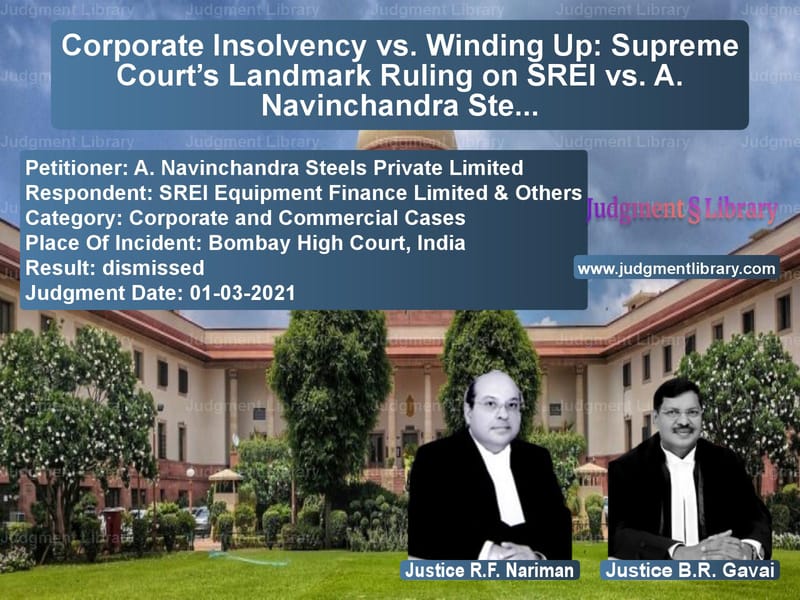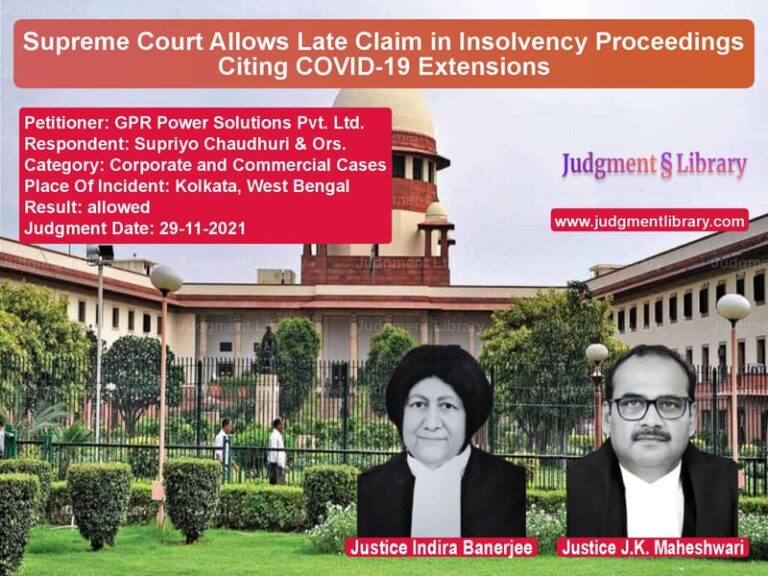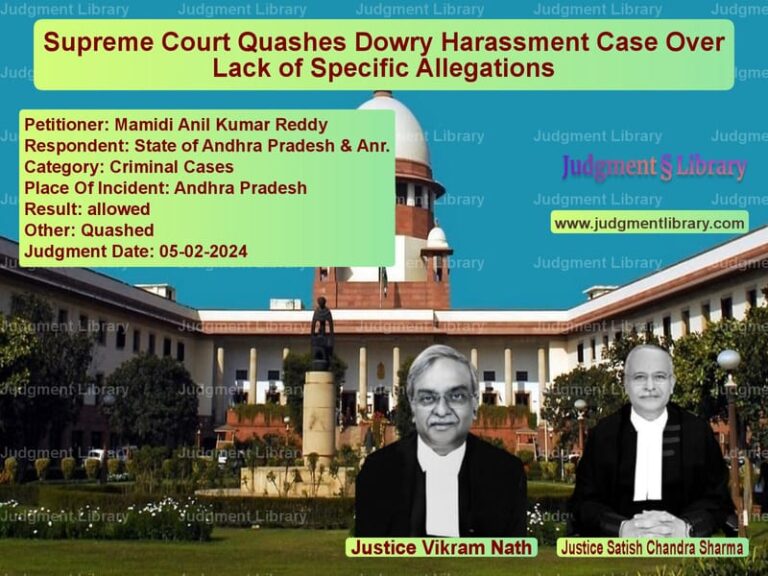Corporate Insolvency vs. Winding Up: Supreme Court’s Landmark Ruling on SREI vs. A. Navinchandra Steels
The Supreme Court of India recently delivered a critical judgment on the conflict between corporate insolvency resolution under the Insolvency and Bankruptcy Code, 2016 (IBC) and winding-up proceedings under the Companies Act, 1956. The case involved A. Navinchandra Steels Pvt. Ltd., an operational creditor, and SREI Equipment Finance Limited, a financial creditor, who sought to initiate insolvency proceedings against Shree Ram Urban Infrastructure Limited (SRUIL), a company already under winding up.
The dispute revolved around whether a creditor can file a fresh insolvency petition under the IBC when a company is already undergoing winding-up proceedings under the Companies Act. The Court ultimately upheld the supremacy of the IBC, affirming that corporate insolvency resolution should be prioritized over traditional winding-up procedures.
Background of the Case
The legal battle began when A. Navinchandra Steels, an operational creditor, obtained a decree against SRUIL from the Bombay High Court in 2015. Subsequently, winding-up proceedings were initiated against SRUIL, and a provisional liquidator took charge of the company’s assets in 2018.
While the winding-up petition was pending, SREI Equipment Finance Limited, a financial creditor, filed an application under Section 7 of the IBC before the National Company Law Tribunal (NCLT). The NCLT admitted the petition and initiated the Corporate Insolvency Resolution Process (CIRP) against SRUIL.
Aggrieved by this, A. Navinchandra Steels challenged the admission of the IBC proceedings before the National Company Law Appellate Tribunal (NCLAT), arguing that winding-up proceedings had already begun, making a parallel insolvency petition invalid. The NCLAT dismissed the appeal, leading to the present case before the Supreme Court.
Arguments by the Petitioner (A. Navinchandra Steels Pvt. Ltd.)
- The company was already under winding up, and once a winding-up petition is admitted, no other parallel insolvency petition can be filed.
- The IBC cannot override Section 446 of the Companies Act, 1956 (which prevents legal proceedings against a company in liquidation without court approval).
- Winding-up proceedings serve a different purpose compared to corporate insolvency resolution, as they focus on liquidation rather than revival.
- The secured creditor, Indiabulls, had already sold the company’s assets outside of insolvency proceedings, making CIRP ineffective.
- SREI suppressed material facts, including its participation in the winding-up proceedings, and bypassed the correct legal route of transferring the winding-up case to NCLT.
Arguments by the Respondent (SREI Equipment Finance Limited)
- The IBC is a special law that overrides the Companies Act, 1956, as per Section 238 of the IBC.
- A Section 7 proceeding under IBC is an independent proceeding that can be initiated even after a winding-up order has been made.
- The objective of the IBC is to revive financially distressed companies, and winding-up should only be pursued if no resolution plan is viable.
- The sale of SRUIL’s assets by Indiabulls did not mean that the company could not be revived.
- Section 7 of the IBC allows any financial creditor to initiate insolvency proceedings, irrespective of existing winding-up cases.
Supreme Court’s Analysis and Key Observations
The Supreme Court, while analyzing the legal provisions, made the following crucial observations:
- IBC overrides the Companies Act: The Court reiterated that the IBC is a special statute enacted to revive distressed companies, and in case of conflict, it prevails over the Companies Act.
- Independent nature of IBC proceedings: The Court held that insolvency proceedings under Section 7 or Section 9 of the IBC can be initiated even if winding-up proceedings are pending.
- Revival over Liquidation: The judgment emphasized that the IBC aims to revive companies, while winding up results in their closure. Therefore, preference should be given to the IBC process.
- Section 238 of IBC prevails over Section 446 of the Companies Act: The Court ruled that IBC’s non-obstante clause ensures that its provisions override any conflicting provisions in other laws, including the Companies Act.
- Impact of Asset Sale: The Court noted that while Indiabulls, a secured creditor, had sold some assets of SRUIL, there were still remaining assets that could be utilized for resolution.
The Court referenced several past decisions, including Jaipur Metals & Electricals Employees Organization v. Jaipur Metals & Electricals Ltd. and Forech (India) Ltd. v. Edelweiss Asset Reconstruction Co. Ltd., reaffirming the primacy of the IBC.
Supreme Court’s Verdict
The Court dismissed A. Navinchandra Steels’ appeal and upheld the NCLT’s decision to admit the insolvency petition filed by SREI. It ruled:
“A petition either under Section 7 or Section 9 of the IBC is an independent proceeding unaffected by pending winding-up proceedings. Short of an irresistible conclusion that corporate death is inevitable, every effort should be made to resuscitate the corporate debtor in the larger public interest.”
It also vacated its earlier stay on the insolvency proceedings, allowing the NCLT to proceed with the CIRP.
Implications of the Judgment
- This ruling strengthens the position of financial creditors under the IBC, allowing them to initiate insolvency proceedings even if a winding-up petition is pending.
- It clarifies that liquidation should be a last resort, and every effort should be made to restructure companies under the IBC.
- The decision ensures that parallel legal frameworks do not hinder the insolvency resolution process.
- Winding-up petitioners must now consider transferring their cases to the NCLT for CIRP instead of pursuing traditional winding-up proceedings.
Conclusion
The Supreme Court’s ruling in A. Navinchandra Steels Pvt. Ltd. v. SREI Equipment Finance Ltd. reaffirms the IBC’s objective of corporate revival over liquidation. It sets a precedent that insolvency proceedings can proceed independently, even in the presence of winding-up orders. By upholding the priority of the IBC, the Court has ensured that distressed companies are given a fair chance at restructuring, benefiting creditors, employees, and the economy as a whole.
Petitioner Name: A. Navinchandra Steels Private Limited.Respondent Name: SREI Equipment Finance Limited & Others.Judgment By: Justice R.F. Nariman, Justice B.R. Gavai.Place Of Incident: Bombay High Court, India.Judgment Date: 01-03-2021.
Don’t miss out on the full details! Download the complete judgment in PDF format below and gain valuable insights instantly!
Download Judgment: a.-navinchandra-stee-vs-srei-equipment-finan-supreme-court-of-india-judgment-dated-01-03-2021.pdf
Directly Download Judgment: Directly download this Judgment
See all petitions in Company Law
See all petitions in Bankruptcy and Insolvency
See all petitions in Corporate Governance
See all petitions in Shareholder Disputes
See all petitions in Corporate Compliance
See all petitions in Judgment by Rohinton Fali Nariman
See all petitions in Judgment by B R Gavai
See all petitions in dismissed
See all petitions in supreme court of India judgments March 2021
See all petitions in 2021 judgments
See all posts in Corporate and Commercial Cases Category
See all allowed petitions in Corporate and Commercial Cases Category
See all Dismissed petitions in Corporate and Commercial Cases Category
See all partially allowed petitions in Corporate and Commercial Cases Category







